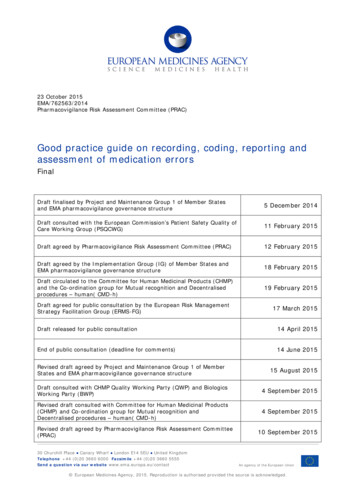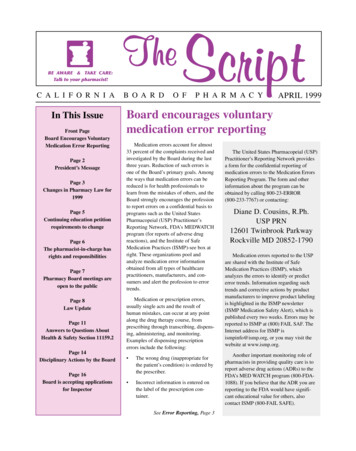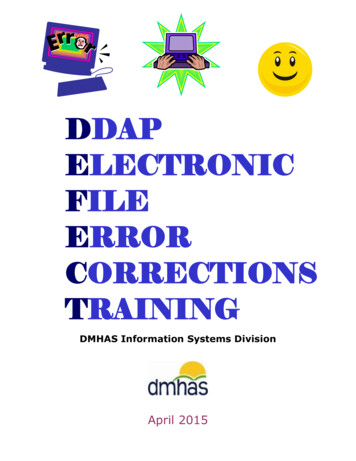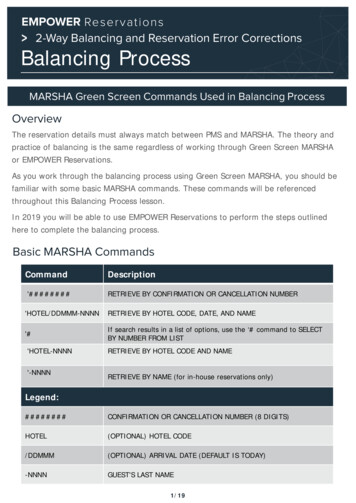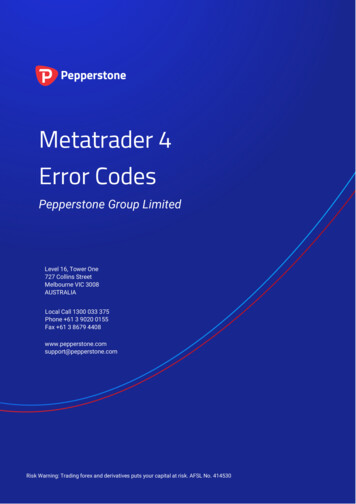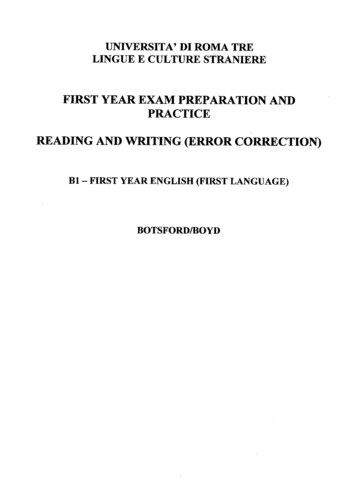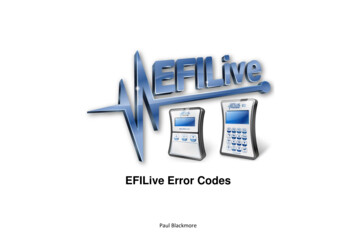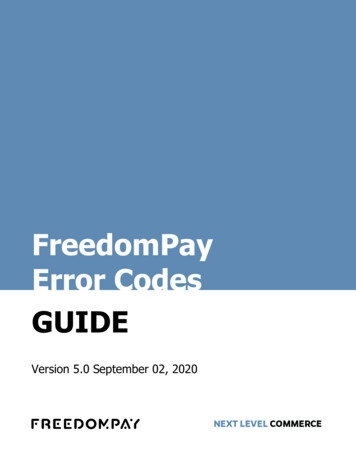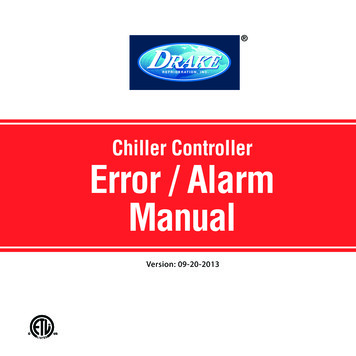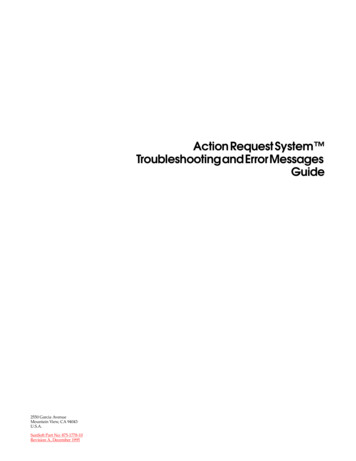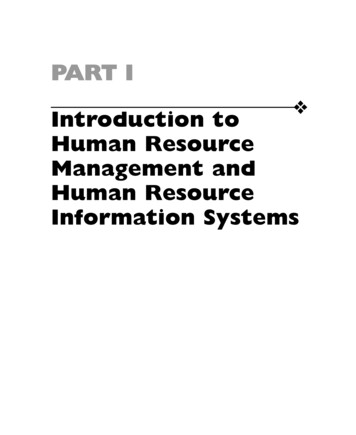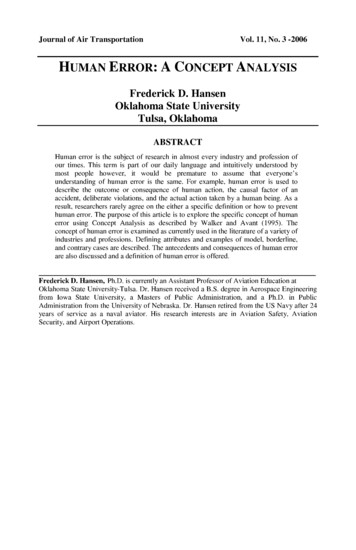
Transcription
Journal of Air TransportationVol.ll, No.3 -2006HUMAN ERROR: A CONCEPT ANALYSISFrederick D. HansenOklahoma State UniversityTulsa, OklahomaABSTRACTHuman error is the subject of research in almost every industry and profession ofour times. This term is part of our daily language and intuitively understood bymost people however, it would be premature to assume that everyone'sunderstanding of human error is the same. For example, human error is used todescribe the outcome or consequence of human action, the causal factor of anaccident, deliberate violations, and the actual action taken by a human being. As aresult, researchers rarely agree on the either a specific definition or how to preventhuman error. The purpose of this article is to explore the specific concept of humanerror using Concept Analysis as described by Walker and Avant (1995). Theconcept of human error is examined as currently used in the literature of a variety ofindustries and professions. Defming attributes and examples of model, borderline,and contrary cases are described. The antecedents and consequences of human errorare also discussed and a definition of human error is offered.Frederick D. Hansen, Ph.D. is currently an Assistant Professor of Aviation Education atOklahoma State University-Tulsa. Dr. Hansen received a B.S. degree in Aerospace Engineeringfrom Iowa State University, a Masters of Public Administration, and a Ph.D. in PublicAdministration from the University of Nebraska. Dr. Hansen retired from the US Navy after 24years of service as a naval aviator. His research interests are in Aviation Safety, AviationSecurity, and Airport Operations.
62Journal of Air TransportationINTRODUCTIONWhen words and terms are commonly used to describe a particularphenomenon, assumptions may be made by both the authors and theiraudience. Indeed, it is not unusual to find articles that do not even include aspecific definition of the word or term. The assumption that all parties bothunderstand and agree with a specific term may be erroneous. Human error isone term that has become part of the common vernacular in aviation yet ithas a wide variety of meanings within the industry. For example, humanerror is used to describe the outcome or consequence of human action, thecausal factor of an accident, and as an action itself.This lack of a common definition of the term complicates the attemptsof researchers to identify meaningful approaches to reducing the effect ofhuman error within our individual professions. Without a working concept ofhuman error, how is it that we can announce that 72% of Navy and MarineCorps flight mishaps between 1995 and 1999 were the result of pilot error(Erwin, 2000); or that human error in road accidents "was the sole cause in57% of all accidents and was a contributing factor in over 90%" (Green &Senders, n.d., p.1); or that "medical errors are the eighth leading cause ofdeath in the United States" (McFadden, Towell, & Stock, 2004, p.2)? Otherindustries and researchers declare human error to be the cause of anywherefrom 30% to nearly 100% of accidents.Concepts, like words in our language, evolve over time and may havemore than one accepted definition. This paper therefore, does not purport toidentify the one true meaning of human error but will offer a definition thatincludes defining attributes of the concept along with a discussion of theantecedents and consequences of the concept. The use of model, borderline,and contrary cases will illustrate both what human error is and what it is not.RESEARCH DESIGNConcept analysis is a research strategy that can be used as an essentialelement of theory development. The analysis involves a formal, linguisticexercise that enables a researcher to examine the attributes andcharacteristics of a concept in order to determine which phenomena clarify aconcept and which do not. Concept analysis is used to clarify overused andvague concepts that are part of our vernacular so that those using the term inthe future start from the same definition. The result of the concept analysisprocess is an operational definition that has, as a minimum, at least someconstruct validity.A concept analysis should not be considered as a final, completedproject because concepts change over time, sometimes quite rapidly.
Hansen63Different researchers may develop slightly different attributes for the sameconcept or the scientific and general knowledge surrounding the concept haschanged. "Concept analysis encourages communication . . . will make if fareasier to promote understanding among our colleagues about the phenomenabeing observed" (Walker & Avant, p. 37-38).Concept analysis produces additional benefits to future researchersdealing with the concept. First, concept analysis helps the investigator inunderstanding the underlying attributes of the concept. Second, conceptanalysis helps to clarify what the concept is, what the concept is similar to,and what the concept is not. Finally, concept analysis identifies theantecedents and consequences of the concept. Antecedents are those eventsthat occur before the concept can occur and consequences are events thathappen as a result of the occurrence ofthe concept (Walker & Avant, 1995).Wilson (1963) developed an eleven-step process for concept analysis.This was later streamlined and simplified by Walker and Avant (1995) intoan eight-step process. The first two steps used by Walker and Avant dealwith selecting the concept for analysis and determining the purpose of theanalysis. These are both preparatory steps and are not tied to the actualresearch methodology of concept analysis. The following simplified six-stepprocess will be followed:1. Identify all uses of the concept that you can discover.2. Determine the defining attributes.3. Construct a model case.4. Develop constructed cases.5. Identify antecedents and consequences.6. Define empirical referents.USES OF THE CONCEPTEtymology is the study of word origins and is an important element of aconcept analysis because it offers clues to the evolution of language.Dictionaries, on the other hand, are the repositories of how words are usedwell after they have become part of our vernacular. According to the OnlineEtymology Dictionary (2001), error dates to circa 1300 from the Old Frenchword errur from the Latin word errorem, "wandering, straying, mistake,"and from the Latin errare "to wander." Although error meant to wander orstray in most languages, the Irish word for error, dearmad, derived from theIrish word, dermat, meaning, "a forgetting."The Oxford English Dictionary (OED, 1986) provides the followingdefinitions of the word error:
64Journal of Air Transportation1. The action of roaming or wandering; hence a devious or windingcourse, a roving, winding. 2. Chagrin, fury, vexation; a wanderingof the feelings; extravagance of passion. 3. The action or state oferring. 3a. The condition of erring in opinion; the holding ofmistaken notions or beliefs; an instance of this, a mistaken notion orbelief; false beliefs collectively. 3b. Something incorrectly donethrough ignorance or inadvertence; a mistake; a flaw, malformation.(p. 277-278)According to the American Heritage College Dictionary (1997) error is:1: an act, an assertion, or a belief that unintentionally deviates fromwhat is correct, right, or true. 2: the condition of having incorrect orfalse knowledge 3: the act or an instance of deviating from anaccepted code of behavior: 4. a mistake. (p. 466)The Oxford English Dictionary (OED, 1986) provides the followingdefinitions of the word human:1. of, belonging to, or characteristic of man. 2. of the nature of man.3. belonging or relative to man as distinguished from God orsuperhuman beings. 4. having or showing the qualities or attributesproper to or distinctive of man. (p. 1,345)The etymology of human dates back to approximately 1250:From Middle French humain "of or belonging to man," from Latinhuman us, probably related to homo (genitive, hominis) "man," andto humus "earth," on notion of "earthly beings," as opposed to thegods (cf. Classical Hebrew, adam "man," from adamah "ground").Cognate with Old Lithuaian zmuo "man, male person. (OnlineEtymology Dictionary, 2001)Combining the meanings of the word "human" with the word "error"leads to an examination of "human error"-characteristics of human beingsthat involve unintentional deviations from what is correct, right, or true.It is common for investigators to identify different types of human errorin their research (Reason 1990; Strauch 2002; Wiegmann & Shappell 2003;McFadden, Towell, & Stock 2004). Synonyms therefore are useful indeveloping the attributes of a concept because they provide clues to what isalmost the concept but differs in some way from the concept. Webster's NewWorld College Dictionary (2001) provides the following synonyms for error:
Hansen65Error implies deviation from truth, accuracy, correctness, right, etc.and is the broadest term in this comparison [an error in judgment, incomputation, etc]; mistake suggests an error resulting fromcarelessness, inattention, misunderstanding, etc. and does not initself carry a strong implication of criticism [a mistake in reading ablueprint]; blunder implies stupidity, dumbness, inefficiency, etc.,and carries a suggestion of more severe criticism [a tactical blundercost them the war]; a slip is a mistake, usually slight, madeinadvertently in speaking or writing; a faux pas is a social blunderor error in etiquette that causes embarrassment. (p. 483)The use of the concept by authors, politicians, and other historicalfigures also provides clues to the characteristics of human error. Probably themost familiar quotation, certainly the most cited, is the Latin phrase errareest humanum-to err is human. The British philosopher John Locke wrote,"All men are liable to error; and most men are, in many points, by passion orinterest, under temptation to it" (Nidditch, 1979, p. 706). President ThomasJefferson noted "error is to be pitied and pardoned: it is the weakness ofhuman nature" (Jefferson, 1950/1775, p. 283). Physician and educator LewisThomas (1979) wrote that errors are part of the human makeup when henoted that humans are coded for error. He considered it an inescapablereality that human beings are built to make mistakes. Stephen Casey (1998)did not specifically define human error but noted that there areincompatibilities between the characteristics of people and the characteristicsof the technology we use. The difference between success and failures thenlies in how well we minimize those incompatibilities.It is also appropriate to learn how human error is used in the literature ofvarious professions. The books and articles dealing with human error areobviously too numerous to adequately address all of the diverse opinionsabout the human error but a sampling across several professions is important.The following sections will focus on the broad fields of transportation,accident investigation, and human factors and then expand into a sampling ofother professions that deal with human error.TransportationAll modes of transportation deal with human error, particularly as itrelates to accidents. Human error or pilot error is readily pointed to as thecause factor of most aircraft accidents although maintenance errors and AirTraffic Control errors also receive attention. The role of human error inhighway accidents, shipping accidents, train accidents, and pipelineaccidents is well researched.
66Journal of Air TransportationHumans commit driving errors because humans have three falliblemental functions (perception, attention, and memory) that limit the ability toprocessing information. It is the situation that exceeds the limits of humanmental functions that leads to road accidents. (Green & Senders, n.d.).Jim Hall (1995), Chairman of the National Transportation Safety Boardstated that:Humans bear the ultimate responsibility for recognizing,interpreting, compensating for, and correcting or mitigating theconsequences of deficiencies, failures, and malfunctions in thehardware and software, and ironically in their own performance.Because the human retains responsibility for the system, regardlessof its level of automation, human/machine system failures are oftenreported as human error. (p. 4)Senders and Moray (1991) wrote, "error is something that has been donewhich was not intended by the actor, nor desired by a set of rules or anexternal observer, or that let the task or system outside its acceptable limits"(p. 25).Ahlstrom & Hartman (2001) in their discussion on human error inairway facilities, noted that human errors are frequently less associated withhuman characteristics than with error-likely conditions. "People are set upfor error by the system design" (p. 2).Goulielmos and Tzannatos (1997) in a discussion on shipping safetynoted human errors have become more critical in the man-machine interfaceof the bridge. Typical operator errors may be presented as perceptual-motorerrors related to skill, procedural errors related to rules, and inadequatemonitoring errors.Accident investigation/preventionSidney Dekker (2002) does not specifically define human error butdifferentiates between an old view of human error as the cause of a mishapand a new view of human error as a symptom of externalities acting upon ahuman being in a specific situation.Woods, Johannesen, Cook, & Sarter (as cited in Strauch, 2002) definehuman error as:A specific variety of human performance that is so clearly andsignificantly substandard and flawed when viewed in retrospect thatthere is no doubt that it should have been viewed by the practitioneras substandard at the time the act was committed or omitted. (p. 2021)Strauch (2002) defines human error as "an action or decision that resultsin one or more unintended negative outcomes" (p. 21). The fundamental
Hansen67attributes of error involve what a human does or intends to do but that leadsto outcomes that differ from
His research interests are in Aviation Safety, Aviation Security, and Airport Operations. 62 Journal of Air Transportation INTRODUCTION When words and terms are commonly used to describe a particular phenomenon, assumptions may be made by both the authors and their audience. Indeed, it is not unusual to find articles that do not even include a specific definition of the word or term. The .
